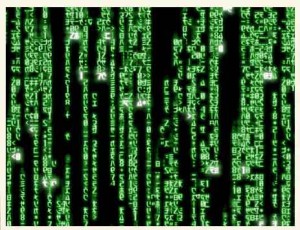This is a tiny followup of a previous post on nonlinear formulas in linear algebra. Let us consider a block matrix \( {M} \) of size \( {(n+m)\times(n+m)} \) of the form
\[ M= \begin{pmatrix} A & B \\C & D \end{pmatrix} \]
where \( {A,B,C,D} \) are \( {n\times n} \), \( {n\times m} \), \( {m\times n} \), \( {m\times m} \). If \( {D} \) is invertible then
\[ \det(M)=\det(A-BD^{-1}C)\det(D). \]
This follows immediately from the identity (mentioned in Wikipedia)
\[ \begin{pmatrix} A & B \\ C & D \end{pmatrix} \begin{pmatrix} I & 0 \\ -D^{-1}C & I \end{pmatrix} = \begin{pmatrix} A-BD^{-1}C & B \\ 0 & D \end{pmatrix} \]
(the determinant of a block triangular matrix is the product of the determinants of its diagonal blocks). If \( {m=n} \) and if \( {C},{D} \) commute then \( {\det(M)=\det(AD-BC)} \). Note that \( {A-BD^{-1}C} \) is the Schur complement of \( {A} \) in \( {M} \). Similar formulas are derived in arXiv:1112.4379 for the determinant of \( {nN\times nN} \) block matrices formed by \( {N^2} \) blocks of size \( {n\times n} \).

The paper by Philip Powell recommended at the end is naive and is nothing but an ordinary Cholevsky decomposition of a matrix by blocks…
Hi Gérard. Any better idea?
Any similar formula for permanent function instead of determinant?
I have applied the analysis in Powell’s paper to a block companion matrix and the result I get is inconsistent with numerical results obtained in MATLAB, is Powell’s method correct?!
Good job. Good related note.
Where comes from the identity matrix which is multiplied with block matrix
what if D is not invertible ?